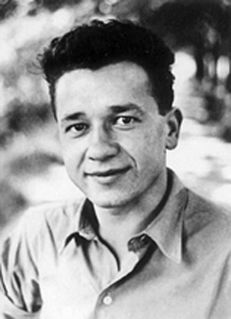A Quote by Eugene Wigner
The unreasonable efficiency of mathematics in science is a gift we neither understand nor deserve.
Quote Topics
Related Quotes
Eugene Wigner wrote a famous essay on the unreasonable effectiveness of mathematics in natural sciences. He meant physics, of course. There is only one thing which is more unreasonable than the unreasonable effectiveness of mathematics in physics, and this is the unreasonable ineffectiveness of mathematics in biology.
The miracle of the appropriateness of the language of mathematics for the formulation of the laws of physics is a wonderful gift which we neither understand nor deserve. We should be grateful for it and hope that it will remain valid in future research and that it will extend, for better or for worse, to our pleasure, even though perhaps also to our bafflement, to wide branches of learning.
Mathematics has two faces: it is the rigorous science of Euclid, but it is also something else. Mathematics presented in the Euclidean way appears as a systematic, deductive science; but mathematics in the making appears as an experimental, inductive science. Both aspects are as old as the science of mathematics itself.
Where there is Love and Wisdom, there is neither Fear nor Ignorance.
Where there is Patience and Humility, there is neither Anger nor Annoyance.
Where there is Poverty and Joy, there is neither Cupidity nor Avarice.
Where there is Peace and Contemplation, there is neither Care nor Restlessness.
Where there is the Fear of God to guard the dwelling, there no enemy can enter.
Where there is Mercy and Prudence, there is neither Excess nor Harshness.
The subject for which I am asking your attention deals with the foundations of mathematics. To understand the development of the opposing theories existing in this field one must first gain a clear understnding of the concept "science"; for it is as a part of science that mathematics originally took its place in human thought.
If you ask ... the man in the street ... the human significance of mathematics, the answer of the world will be, that mathematics has given mankind a metrical and computatory art essential to the effective conduct of daily life, that mathematics admits of countless applications in engineering and the natural sciences, and finally that mathematics is a most excellent instrumentality for giving mental discipline... [A mathematician will add] that mathematics is the exact science, the science of exact thought or of rigorous thinking.
At the still point of the turning world. Neither flesh nor fleshless; Neither from nor towards; at the still point, there the dance is, But neither arrest nor movement. And do not all it fixity, Where past and future are gathered. Neither movement from nor towards, Neither ascent nor decline. Except for the point, the still point, There would be no dance, and there is only the dance.

































